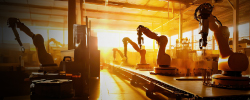Google “how is AI used in Manufacturing” and you’ll find no end of examples and benefits on how you could use AI within your business. But how are manufacturers already embracing Industry 4.0, the Fourth Industrial Revolution, and most notably one of the most disruptive kinds of technology - artificial intelligence?
We explored how leading manufacturers are already harnessing the power of AI across their businesses and manufacturing processes daily to increase efficiency, improve outputs, and improve their customer-facing products.
General Motors
Within the manufacturing process, General Motors are using historical data and real-time data analytics to power AI-driven predictive analytics. Their AI model learns and identifies anomalies that indicate potential malfunctions, enabling early detection and proactive interventions to avoid unscheduled downtimes and a smooth-running supply chain.
To avoid EV range-anxiety, their AI algorithm analyses vehicle telematics, topological data, and driver behaviour to create energy-efficient route recommendations.
With Google Cloud, they’ve brought in conversational AI to their vehicles which use intent-focused algorithms to get customers help quicker, allowing human advisors to focus on emergencies and complex CX needs.
Danone
This yoghurt company is using a "robot stomach" to test the journey of a probiotic through the digestive system. Together with machine learning, AI, medical histories and bodily samples, the company can establish connections between healthy gut bacteria and health outcomes.
This information then shapes product development and marketing strategies, as well as feeding into scientific awareness about improving immunity and disease prevention.
Kraft Heinz
The food giant Kraft Heinz intends to create digital twins for its 34 owned manufacturing facilities in North America. This will help them to test and fine-tune their solutions and processes on digital models before incorporating them into the real-life plant floor.
This technology will help them to address mechanical issues before they occur and identify optimal product capacity.
John Deere
John Deere is using AI to tackle the age-old problem of the welding process, using computer vision to automatically spot common defects in the automated process. Using a combination of hardware and software, they can generate real-time insights at levels humans wouldn’t be able to detect.
If a defect is found, the welding process stops automatically and allows for the issue to be corrected.
Ultimately, this helps maintain the quality of products customers expect of John Deere.
Tetra Pak
To improve recycling initiatives and to advance the circular economy, Tetra Pak as partnered with APR Kerbsite to install an AI-capable robot which can identify and sort used Tetra Pak cartons.
The robot has been trained to learn and recognise all the types of beverage cartons, like milk, soy, oat, almond, and juice - from the 20,000 tonnes of materials collected annually at the recycling plant.
This results in avoiding sending valuable resources to landfill sites.
So what does this mean for you?
By exploring some of these tangible examples of how AI is being used by manufacturers worldwide, we hope we’ve triggered lots of ideas about how you could start considering AI use in your manufacturing business too.
However, we should emphasise that these technologies aren’t just available to big-budget, global companies. Implementation of AI and software technologies is now achievable for any sized business. The key things you need to get started are a good understanding of the problem and patterns, and strong, clean, comprehensive datasets. From there, creating and training and AI is relatively straightforward!
If you’re keen to find out more about AI and its possible applications, check out our page on helping you to get AI-ready, discover how AI is like your office dog… or get in touch with us today for a chat on how you can take the next steps towards Industry 4.0.
hey!
We build custom software with your team, for your team. Our apps and web platforms bring about meaningful change for businesses across the UK.
































